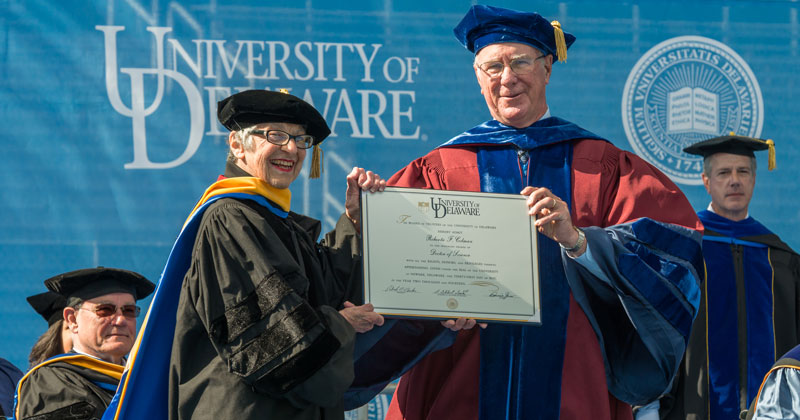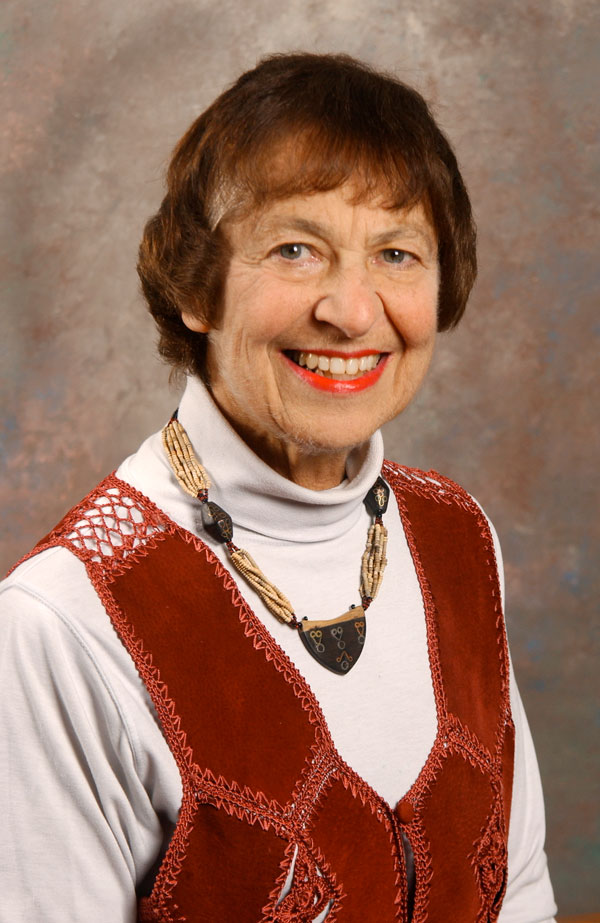


In Memoriam: Roberta Colman
Photos by Evan Krape and Kathy F. Atkinson August 21, 2019
Campus remembers research pioneer, revered mentor
Roberta Colman, a research pioneer and recipient of two of the University of Delaware’s highest honors, died on Aug. 15.
Dr. Colman, who was the Willis F. Harrington Professor Emerita of Chemistry and Biochemistry, served on the faculty of the Department of Chemistry and Biochemistry from 1973 until her retirement in 2009. In 1985, she became the first woman to receive the University’s Francis Alison Award, UD’s highest faculty honor, and she was awarded an honorary doctor of science degree from the University at Commencement in 2014.
Dr. Colman’s honorary degree citation recognized her for her roles as a revered educator and prolific researcher and also saluted her work in mentoring women and minority students. It concluded, “Your pioneering undoubtedly changed and enriched the scientific world in academe; it also has enriched the larger society because of the many contributions that you have made to your field.”
Provost Robin Morgan, who recalled Dr. Colman as “an extraordinarily accomplished scientist and scientific citizen,” said, “She helped to pioneer our understanding of how protein structure relates to function. Throughout her career, Dr. Colman was also instrumental in supporting women and other underrepresented minorities in the sciences. When I came to UD, she welcomed me to the Department of Chemistry and Biochemistry by inviting me to seminars and asking me to serve on graduate committees for her students. Years later, she was instrumental in establishing the Chemistry-Biology Interface graduate program at UD. Roberta Colman’s contributions to science and science culture have influenced many, and the University of Delaware has been fortunate indeed to count her among its faculty.”
Murray Johnston, associate dean for the natural sciences in the College of Arts and Sciences and professor of chemistry, said, “Bobbie Colman was a pillar of the Department of Chemistry and Biochemistry. She helped shape the department over multiple decades of service, and the impact of her effort is evident today.”
Recalling Dr. Colman, Brian Bahnson, chairperson of the Department of Chemistry and Biochemistry, said, “Our department was greatly saddened by the news of the passing of Prof. Roberta ‘Bobbie’ Colman. Bobbie joined our department in 1973 as the fifth biochemist and served on our faculty until her retirement in 2009. She was an inspirational scientist, as demonstrated by an impressive record of publications and federal research funding. Throughout her career at UD, Bobbie has had a profound impact on the training of numerous visiting faculty members, postdoctoral fellows, graduate students, research assistants and undergraduates. Mentoring was important to Bobbie, as she consistently worked to nurture and enable women and minority scientists early in their careers. Bobbie’s career spanned five decades, and she impacted thousands of students. We will miss her, but remember her spirit and many contributions.”
A colleague's tribute
Long-time colleague Hal White, professor emeritus of chemistry and biochemistry, wrote the following memorial article about Dr. Colman:

Roberta (Bobbie) Colman, Willis F. Harrington Professor, joined what then was the chemistry department in 1973 as its fifth biochemist. Her distinguished career in research started in high school as a recipient of a Westinghouse Science Talent Search Award. She graduated from Radcliffe College summa cum laude and went on to graduate school at Harvard where she received a Ph.D. under the direction of the renowned physical organic chemist, Frank Westheimer. After postdoctoral fellowships at NIH and Washington University in St Louis, Roberta joined the faculty in the Department of Biological Chemistry at Washington University in 1966. A year later she moved to the Department of Biological Chemistry at Harvard Medical School.
During her highly productive career, Prof. Colman published over 260 articles in premier biochemistry journals such as the Journal of Biological Chemistry, Biochemistry, Archives of Biochemistry and Biophysics, Nature Genetics, and Protein Science. Many of her publications dealt with the structure of the active sites of enzymes and the function of various amino acid side chains in enzyme catalysis. She pioneered the use of particular reactive nucleotide analogs as affinity labels to probe enzyme active sites. As a world authority on the structure and function of NAD- and NADP-linked isocitrate dehydrogenases and other enzymes such as glutamate dehydrogenase, pyruvate kinase, glutathione S-transferase and adenylosuccinate synthase, she established numerous collaborations and received many honors.
Nationally, Prof. Colman was a fellow of the American Association for the Advancement of Science and a member of numerous professional societies. Among other positions, she was treasurer of the American Society for Biological Chemists from 1981-85. She served on the Executive Council of the American Society for Biochemistry and Molecular Biology (ASBMB) from 1993-1996, and in 1996 she received the Herbert A. Sober Award for scientific achievement from the ASBMB. She served as chair of the Division of Biological Chemistry of the American Chemical Society from 1998-2000. In 1985, she received the University of Delaware’s highest faculty award, the Francis Alison Award, for “that faculty member who has made the most outstanding contributions to his/her field.” Her research accomplishments led to being on the editorial board of Archives of Biochemistry and Biophysics for 27 years, including 17 years as an executive editor. She was associate editor of Protein Chemistry for six years and served on the editorial boards of several other journals including the Journal of Biological Chemistry and Protein Science.
Throughout her career at Delaware, Roberta Colman maintained a well-funded research group of about 10 people, including research assistants, undergraduates, graduate students, postdoctoral fellows and visiting faculty members. Nearly 30 graduate students completed their dissertations under her guidance. Many of these associates have gone on to distinguished careers elsewhere. In addition, she was the program director of the University of Delaware’s NIH-funded Chemistry-Biology Interface graduate program from 1993 to 2009. Students in her laboratory received excellent training. In addition to her work with graduate students and postdoctoral fellows, a large proportion of the undergraduates who worked in her laboratory became coauthors on scientific publications.
Graduate students and undergraduates over the years will remember Roberta Colman as their teacher in the graduate-level biochemistry core courses, CHEM-641 and 642. She also has taught CHEM-214 Elementary Biochemistry for non-majors and CHEM-840, Mechanisms of Enzyme Regulation.
After being one of the only women in her college science classes and after discovering early in her career a large salary discrepancy between herself and similarly qualified male faculty members, Prof. Colman took a special interest in nurturing and enabling the careers of women and minority scientists. She did this through mentoring students in her own laboratory and through service on national committees such as the Committee on Women in Biochemistry and the Educational Affairs Committee of the ASBMB.
Prof. Colman enjoyed traveling. With her husband, Robert, she used summer vacations to travel the world from the Antarctic to Asia and Africa. In each country, she took in the local culture and natural history of each and returned with photographs to share.
After retirement in 2009, Roberta regularly attended classes at the University’s Osher Lifelong Learning Institute where she continued to cultivate her many interests.
Dr. Colman’s influence
Mayura Dange, a former graduate student reflected on Dr. Colman’s influence. “She is the reason I am what I am... Not only a U.S.-graduated scientist, but also a feminist, a travel lover, a hobbyist photographer.... Her scientific excellence is all over the web, but her personality was far beyond science labs and books.… She was a constant learner, who after her retirement at the age of 71, started taking music appreciation and architecture classes at the University. She would subtly emphasize how a woman has to take extra efforts to prove herself while strongly reminding us that being a woman does not entitle you to any freebies or sympathy. There are many life lessons I learned under her guidance, but more personal to me was when I had tried and failed over and over in one part of my project. She was someone who would never give up, but she told me ‘sometimes we have to let go of something that is not working out and focus on what is working. It's not giving up, it's being practical.’"
Anastasia Thévenin, another doctoral student of Roberta Colman, writes, “Rest In Peace, dearest Dr. Colman — my Ph.D adviser. I would not be where I am today without your help and guidance. You were the kindest, most caring person I knew and your positivity was my guiding light during my Ph.D. You will always be the kind of scientist and a woman I will aspire to be.”
Mark Segall, a former postdoctoral researcher, said, “Dr. Colman was an ideal mentor, extraordinarily knowledgeable, but also very willing to consider and discuss the ideas of scientists at earlier stages of their careers. She provided an environment that brought out the very best in her graduate students and postdocs. There was never a single day that I did not feel supported, encouraged and eager to move ahead with my project and determine the outcome of the next experiment. Even years after I left her laboratory, Dr. Colman remained extremely supportive and an enduring role model to me.”
Don Dennis, faculty colleague for many years, remembers a conversation with a visiting speaker who noted that Dr. Colman was such a competent scientist and that she only talked about substantive issues. The visitor then wondered if she ever engaged in small talk. Dennis responded that she did, but she never initiated it because “she had more respect for other’s time than they did for themselves.” Dennis also noted that since the age of 17, Roberta routinely got and did not need more than five hours of sleep a night.
Roberta Colman is survived by her husband, Robert Colman M.D., children Sharon and David, and two grandchildren, Lexi Greenberg and Jason Greenberg.
Contact Us
Have a UDaily story idea?
Contact us at ocm@udel.edu
Members of the press
Contact us at 302-831-NEWS or visit the Media Relations website

